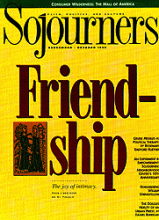William Stringfellow died on March 2, 1985. Many of us have missed him greatly ever since. For the circle of those who were blessed to be his friends, the memory of Bill still burns very bright indeed. Yet, since Stringfellow's death the traces of his thought and work have steadily diminished.
All of his books are out of print. Perhaps because he was a theologian who never had an academic base and continually cast a biblical searchlight on the state of the church, references to William Stringfellow in our seminaries and religious institutions have gradually disappeared. Because he was a lawyer who rejected all the traditional paths and tested the law by conscience, Stringfellow is not revered by most in his profession. Because he was such an articulate political dissenter and resister, the establishments of politics were very eager to forget him as well.
Bill Stringfellow had a way of being very timely and contextual in his theological and political insights. At first glance, his historical relevance can make his book's references to Vietnam, civil rights, Watergate, Richard Nixon, the ordination of women, and nuclear technology seem outdated. But true prophecy, in the biblical tradition, is always marked by historical specificity. That, indeed, is its offense. Prophecy-in-general is never threatening.
For all the prophetic timeliness in his own day, William Stringfellow's radical fidelity to the Word of God and articulation of "biblical politics" seem to be more and more timely for ours as well. Stringfellow was a forerunner to the kind of prophetic spirituality that seems now to be bringing people together from many corners of the church's life.
WHILE neglected since his death, Bill Stringfellow's legacy lives on. I continue to run into those who were deeply influenced by his life and work, literally all over the world. For some of us, there still has been no greater theological influence.
Read the Full Article

